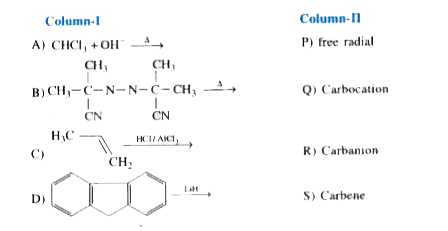6 ml of a standard soap solution (1ml = 0.001g of CaCO3 ) were required in titrating 50ml of water to produce a good lather. Calculate the degree of hardness.Solution in Telugu
50ml of hard water sample requires 6 ml of soap solution.
Volume of soap solution required requid fort 106 ml of hard water to get good lather =106×650=0.12×106m
Given that if 1 ml soap is required for the water sample to get lather, that sample contains . 0.001g of CaCO3
1mlsoap→10−3gCaCO3
0.12×106mlsaop→?
Weight equivalent of CaCO3=120g,Degree of hardness of water sample = 120ppm
Topper's Solved these Questions
- BOOK - AAKASH SERIESCHAPTER - HYDROGEN AND ITS COMPOUNDSEXERCISE - EXERCISE -1.1.113videos
HYDROGEN AND ITS COMPOUNDS
- BOOK - AAKASH SERIESCHAPTER - HYDROGEN AND ITS COMPOUNDSEXERCISE - EXERCISE -1.1.215videos
HYDROGEN AND ITS COMPOUNDS
- BOOK - AAKASH SERIESCHAPTER - HYDROGEN AND ITS COMPOUNDSEXERCISE - EXERCISE ON PASSAGE14videos
HYDROGEN AND ITS COMPOUNDS
- BOOK - AAKASH SERIESCHAPTER - HYDROCARBONSEXERCISE - ADDITIONAL PRACTICE SHEET ( LEVEL-II (PRACTICE SHEET (ADVANCED) (MATRIX MATCHING TYPE QUESTIONS)))5videos
HYDROCARBONS
- BOOK - AAKASH SERIESCHAPTER - IONIC EQUILIBRIUM EXERCISE - ADDITIONAL PRACTICE EXERCISE (LEVEL -II PRACTICE SHEET (ADVANCED) (Integer Type Questions))8videos
IONIC EQUILIBRIUM
Similar Questions
Discuss briefly the position of hydrogen in the periodic table.
05:18View SolutionWhat is meant by hardness of water? How many types are there?
04:26View SolutionRead the following passage and answer the questions that follow.
Electron-precise compounds have the required number of electrons to write their conventional Lewis structures. All elements of group 14 form such compounds which are tetrahedral in geometry. Electron - rich hydrides have excess of electrons which are present as lone pairs. Elements of groups 15-17 form such compounds. Metallic hydrides are formed by many d-block and f-block elements. These hydrides conduct heat and electricity though not as efficiently as their parent metals do. They are non-stoichiometric.
Electron precise compound among the following is03:27View SolutionMatch the intermediates formed in the reaction.
 01:56View Solution
01:56View SolutionA certain weak acid has Ka,=10−5. If the equilibrium constant for is its reaction with a strong base is repesented as y×10y then find the value of y.
01:19View Solution50 " mL of " water on titration with standard soap solution gave the following results: Lather factor =0.4 mL, total hardness (TH)=8.2mL, permanent hardness (PH)=2.5mL and standard hard water (containing 0.2gCaCO3L−1)=19.9mL. Calculate each type of hardness in ppm.
05:11View Solution100 mL sample of distilled water, tap water and boiled water required, respectively, 2 mL,17 mL and 7 mL of soap solution to form permanent lather. The ratio of permanent to temprorary hardness in the tap water is
02:15View Solution25mL samples of distiled water, tap water and boiled water required, respectively, 1mL,13mL and 5mL of soap solution to form a permanent lather. The ratio of temporary to permanent hardness in the tap water is
03:20View SolutionStatement-1 : MgCl_2 solution produces lather with soap. Statement-2 : Hard water does not produce lather with soap.
03:26View Solution12 ml of saturated solution .001gr of CaCO_(3) were required in the titration of 100 ml of water to produce a good lether its degree of hardness is
01:55View Solution6 ml of a standard soap solution (1ml = 0.001g of CaCO3 ) were required in titrating 50ml of water to produce a good lather. Calculate the degree of hardness.
06:47View SolutionDegree of hardness of a water sample is 100ppm. 50 ml of standard soap solution is added to one kilogram of hard water sample. Calculate the degree of hardness of the resulting water sample. (one ml of soap solution is 0.001 g CaCO3).
02:16View Solution50 ml of water has degree of hardness 160ppm. If a standard soap solution is labelled as 1ml = 1mg of CaCO3 , what volume of soap solution can produce lather?
04:20View SolutionA hard water sample contains magnesium bicarbonate only. 100 ml of the hard water sample requires 10 ml. of standard soap solution (1 ml soap solution = 1 mg CaCO3 ) to get good lather. Find out of the weight of Ca(OH2) to be added to 10 Kg water sample to make it soft water.
02:38View Solution50 ml of water sample requires 6 ml of soap solution to produce a good lather. 1 ml of soap solution is equal to 0.001 g of CaCO3 . Then the degree of hardness of water is
01:44View Solution

